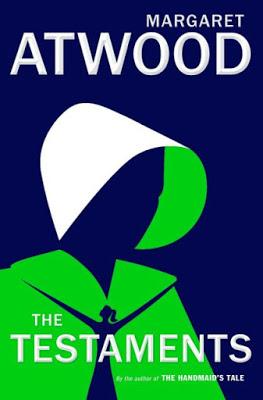
I was curious to see how Atwood handled a return to Gilead after so much time, a television series, and a world that is slipping ever nearer to the sanctimonious evil of her authoritarian dystopia.
Her choice of three narrators--the daughter of a high-ranking Commander, a second girl who grew up in Canada with parents who deplored Gilead's policies, and the hated Aunt Lydia, one of the chief enforcers of Gilead's female related laws, proved an excellent means of telling us more about the inner working of this repugnant society.
It's been quite a few years since I read The Handmaid's Tale, and I've not watched the television series. So I was pleased to learn more--Atwood's world(society)-building skills are top notch and I was entranced by the first part of the novel. The early scene where professional women are rounded up and discover that they have been stripped of all rights was chilling, partially because in the present political climate, it doesn't seem impossible.
As the woman who will become Aunt Lydia thinks: Stupid, stupid, stupid: I'd believed all that claptrap about life, liberty, democracy, and the rights of the individual . . .I'd depended on that, as if on a magic charm. . .
There's been a coup, here in the United States . . .Any forced change in leadership is always followed by a move to crush the opposition. The opposition is led by the educated, so the educated are the first to be eliminated. . .
I see such parallels with our current regime. The educated are not being rounded up, not yet, but they are being systematically devalued with cries of fake news and elitism. Not to mention 45*'s choices for his administration where actual knowledge is trumped by loyalty to the Orange One.
Gilead's society continues to have chilling similarities to the religious right's vision for the US and I found that part of the book quite compelling. I also liked learning Aunt Lydia's full story.
But once the setup of the story was complete--and it's an interesting, well thought out setup--the plot turned a bit melodramatic, like a well done Young Adult thriller. It also seemed rushed. Not bad --but not as compelling as the the earlier part of the novel--or as the previous novel.
Still, I'd heartily recommend The Testaments to anyone who enjoyed The Handmaid's Tale. It's satisfying to learn more and to come to a tying up of loose ends.
Those of you who've read it, what did you think?
